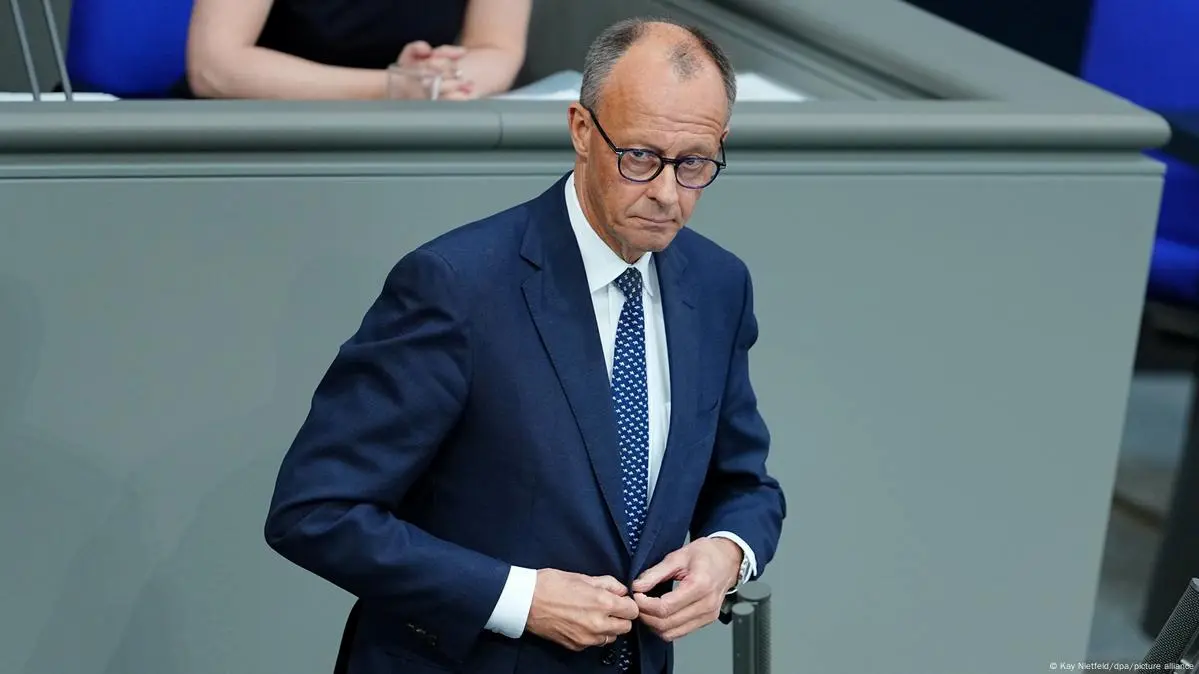Berlin (Parliament Politics Magazine) – Chancellor Friedrich Merz’s bid for a 260,000-strong army faces setbacks as coalition partner SPD resists lottery-based conscription at 18.
As reported by The Telegraph, in May, Friedrich Merz pledged to strengthen Germany’s military against Russia, declaring, “Germany is back!”
The Chancellor removed strict debt limits, allowing Germany to increase defense spending significantly.
Mr Merz introduced a €500bn (£430bn) special fund to upgrade Germany’s infrastructure, including roads and bridges, to facilitate forces’ deployment and tank movement in case of war with Russia.
SPD to block Friedrich Merz’s 260,000-strong army plan
Last week, Friedrich Merz faced political resistance from coalition allies over his plans for mandatory military service for 18-year-olds.
His proposal to conscript young men through a lottery has raised tensions within his coalition, aiming for a 260,000-strong army by 2030.
The Christian Democrats insist that the lottery provides a “fair and rational” backup if Germany’s volunteer military scheme falls short.
The Social Democrats, Mr Merz’s partners, face criticism for stalling the reform, defending voluntary service amid pressure from young voters.
SPD Defence Minister Boris Pistorius had to call off a press briefing due to a deep rift over the military service scheme.
Mr Merz’s plan to expand the army by thousands through conscription appears increasingly unstable amid political tension. He faces the risk of failing to secure coalition support, putting his plan for Europe’s “strongest conventional army” in jeopardy.
The CDU leader’s defence plan contains a lottery-based conscription, which he claims will transform Germany’s Bundeswehr into the nation’s most powerful conventional force.
Post-war German politics leaves little room for strongmen, relying instead on multi-party coalitions that must collaborate carefully to reach compromises.
Once a Marxist movement, the SPD shows strong pacifist tendencies, with some backbenchers and senior figures expressing nostalgic views of Moscow.
Gerhard Schröder, former SPD Chancellor known for his Kremlin-friendly stance, remained close to Russia’s Vladimir Putin even after the invasion of Ukraine.
Boris Pistorius’ plan to abandon the military service reform
SPD’s Boris Pistorius, known as one of the party’s hawkish voices on Russia, has spent years pushing the party to rethink its traditional stance.
He argued that Germany needs to become “kriegstüchtig,” or war-ready, treating Russia as a threat rather than an old ally from the Communist era.
His move to scrap the military service bill this week suggests he has given in to strong opposition from the party’s traditional voices.
Mr Pistorius tried to calm tensions over the design of Germany’s new military service system, saying he hopes for a compromise.
He added that conscription would need to be introduced if the new scheme fails to attract enough volunteers.
Norbert Röttgen, a senior CDU lawmaker, argued that the lottery represents a civic gamble, adding,
“Every man faces the same chance and the same risk … in this equality lies the fairness and rationality of the procedure.”
What did Carlo Masala say about SPD blocking the military service bill?
According to political expert Carlo Masala, the SPD is using “tactical opposition” to block the military service plan, citing the lottery element as unpopular with young voters.
He said,
“Parts of the SPD fear that they will lose young voters in the upcoming elections if they agree to military service with compulsory elements.”
Referring to a failed attempt to adopt the Swedish model, Mr Masala added,
“The SPD youth wing is also opposed [to conscription]. This has already prevented Pistorius from passing a more ambitious law in the last government.”
Colonel Patrick Sensburg’s views on Germany’s conscription plans
Colonel Patrick Sensburg, the president of Germany’s Reservist Association, said,
“Currently, there is a lack of capacity to train, equip, and accommodate large numbers of conscripts.”
He added,
“If conscription is decided upon, these capacities would need to be ramped up as quickly as possible.”
Poll about young Germans’ views on conscription
A recent survey revealed that only 37% of Germans aged 18-29 support conscription, raising concerns about potential draft dodging.
Analysts warn that Germany’s armed forces lack the capacity to absorb a large influx of recruits.
Some argue the current conscription debate echoes a previous CDU-SPD clash over sending Taurus missiles to Ukraine.
What did Chancellor Merz say about Germany’s military ambitions?
Friedrich Merz stated,
“The federal government will provide all the financial resources that the Bundeswehr needs to become the strongest conventional army in Europe. This is more than appropriate for the most populous and economically strongest country in Europe. Our friends and partners also expect this from us, and what’s more, they are actually demanding it.”
The chancellor said,
“Our goal is a country, a Germany, and a Europe that are together so strong that we never have to use our weapons.”
Key details about the Ukraine-Russia war
The war started in February 2014 with the Russian annexation of Crimea. It escalated into a full-scale invasion when Russia launched an attack on Ukraine on 24 February 2022.
The UN Human Rights Office has verified the deaths of 13,883 civilians in Ukraine. Ukraine’s General Staff reports approximately 1.13 million Russian military deaths.


